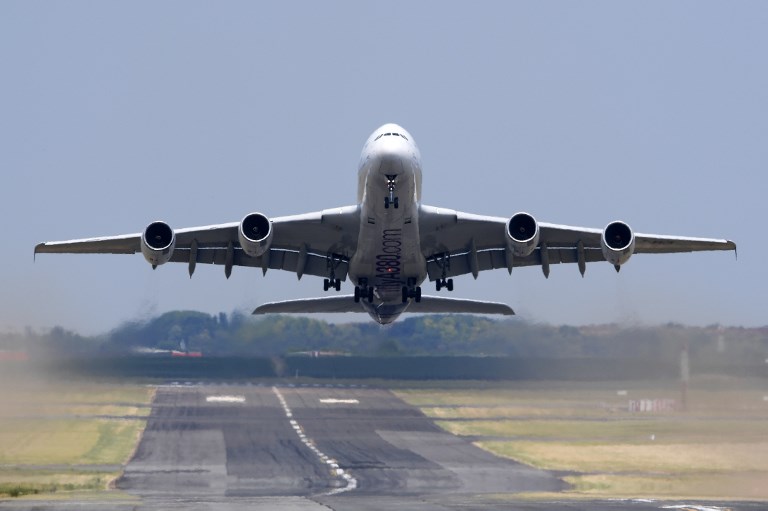
An Airbus A380 takes off during a flying display at the International Paris Air Show in Le Bourget outside Paris on June 21, 2017. AFP
PARIS, France — Airbus said Monday that it might have to end production of the double-decker A380 superjumbo jet, having booked no new orders for the plane in two years.
The European aerospace group had been banking on another big order from main client Emirates in November, but the Dubai-based airline decided instead to buy 40 of Boeing’s Dreamliners.
Airbus’s decision in 2007 to pursue the A380, capable of packing in 853 seats, was diametrically opposed to Boeing’s bet on the Dreamliner, marketed as a more efficient plane that could be used for both medium and long-distance flights.
But the economics of the A380 have proved daunting, with airlines having to fly every flight at full capacity in order to make a profit.
“We are still talking to Emirates, but honestly, they are probably the only one to have the ability right now on the market place to take a minimum of six per year on a period of eight to 10 years,” Airbus’s sales director, John Leahy, said.
“Quite honestly, if we can’t work out a deal with Emirates there is no choice but to shut down the program,” he said.
The A380 has a 2018 list price of $446 million (547 million euros), and as of December it had booked 317 orders for the plane from 18 airlines. Of those, 222 have been delivered.
But the last order, for three jets by Japan’s ANA, goes back to January 2016 — and that was the first after nearly three years since a huge order for 50 A380s by Emirates in 2013.
‘Magnificent plane’
So far, the A380 has cost Airbus 18 billion to 20 billion euros, and the company says it needs to build at least six a year for the program to remain viable.
“We will deliver 12 aircraft as planned in 2018,” chief operating officer Fabrice Bregier said, down from 27 in 2015.
“The challenge will be to maintain at least this level in the years to come” before customers start placing replacement orders for the A380s they currently have in service, and “potential new markets” start opening up, he said.
He said the fact the programme could exist with just six planes built each year was a testament to its efficiency, adding that the “magnificent plane” was widely acclaimed by passengers.
In many ways, the A380 programme is a race against time: Airbus is hoping China will lead a revival in orders once demand for long-haul planes picks up, arguing that the plane is ideally suited for mass-market travel and for heavily congested airports.
“The best would be more orders for the A380. We worked on this during the French president’s visit to China last week, and we will continue to work on this,” Economy Minister Bruno Le Maire said at a press conference Monday.
China is expected to become the world’s biggest air travel market in 2022, surpassing the United States, according to the International Air Transport Association (IATA).
Looking ahead, Bregier said the company’s overall deliveries could rise to 800 this year given the increased pace of production of the A320neo — Airbus’s response to the Dreamliner challenge.
Deliveries have been slowed by problems with the plane’s engines made by US firm Pratt & Whitney and by CFM, the joint venture of General Electric and Safran, but Bregier said these were being worked out.
Overall, Airbus said it booked a total 1,109 aircraft orders and a record 718 deliveries in 2017, outpacing Boeing’s 912 orders but falling short of its rival’s 763 deliveries.
Airbus shares slid 0.4 percent in trading in Paris on Monday. /cbb

